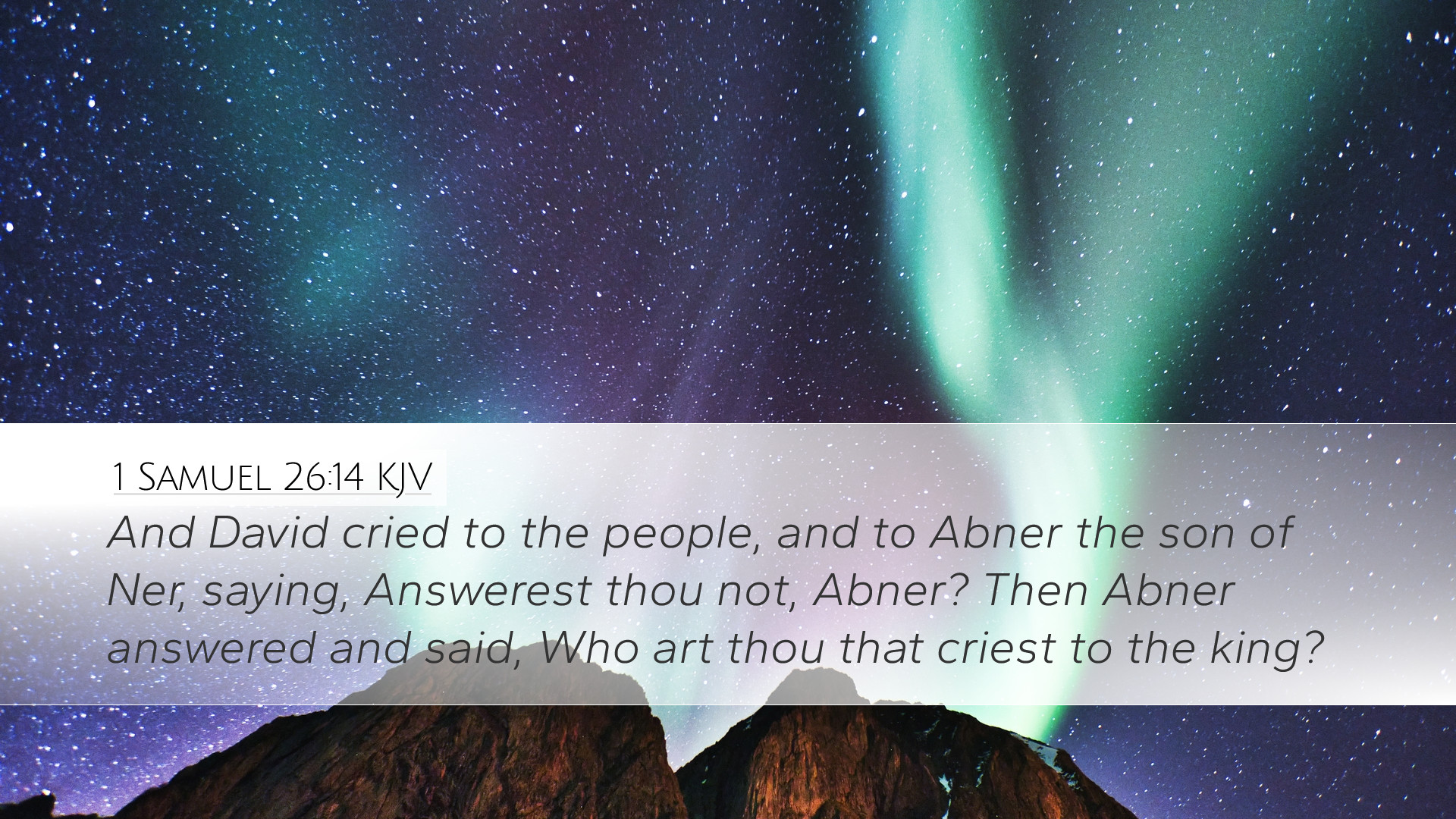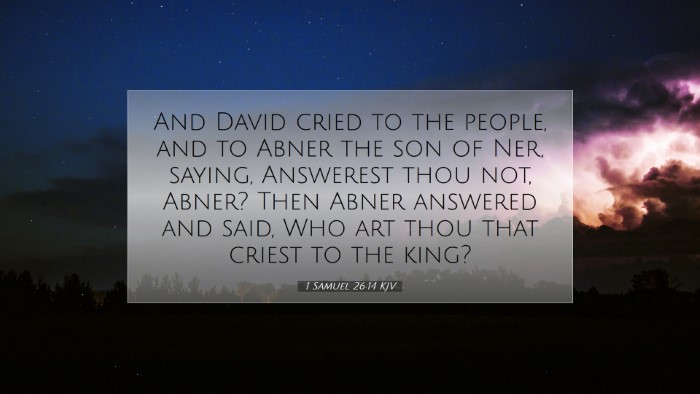Commentary on 1 Samuel 26:14
Verse: "And David cried to the people, and to Abner the son of Ner, saying, 'Answerest thou not, Abner?' Then Abner answered and said, 'Who art thou that criest to the king?'" (1 Samuel 26:14, KJV)
Contextual Background
The passage takes place during the tumultuous period in ancient Israel when David was fleeing from King Saul, who was seeking his life out of envy and fear. David, previously anointed as king by Samuel, found himself in situations that tested his character, faith, and leadership qualities.
Summary of Insights from Public Domain Commentaries
Matthew Henry's Commentary
Matthew Henry focuses on the theme of providence and the divine safeguarding of David. In his commentary, he notes how David's encounter with Saul in the wilderness serves as a pivotal moment showcasing God's protection over him. The cry to Abner signifies both a challenge and an opportunity.
Henry emphasizes that David uses this moment to remind Abner, the commander of Saul's army, of his duty, highlighting the negligence of those who serve the king. This call out serves a dual purpose: it makes Saul aware of David's presence and reignites the concept of loyalty and justice in leadership.
Albert Barnes' Notes on the Bible
Albert Barnes provides a thorough breakdown of the verse, particularly focusing on the significance of Abner's name recognition and response. Barnes suggests that Abner's lack of awareness regarding the threat posed suggests a larger theme of spiritual blindness among leaders, who often fail to perceive the larger metaphysical realities surrounding them.
Furthermore, Barnes points out that David's approach is filled with a blend of assertiveness and wisdom. He confronts the situation not with violence but with a questioning that reflects his confidence in God's promise. This reflects the broader biblical principle of trusting in God's timing and justice, even in dire circumstances.
Adam Clarke's Commentary
Adam Clarke elaborates on the implications of the dialogue between David and Abner. He discusses the socio-political ramifications of David’s question and Abner's response, interpreting it as a moment of public accountability. Clarke highlights the importance of recognizing God’s appointment of leadership, positing that Abner’s inability to identify David underscores a leadership failure.
Clarke also reflects on the moral and ethical qualities exhibited by David here. He refrains from taking revenge and instead utilizes a moment to engage with an adversary constructively, calling leaders to exhibit integrity and wisdom.
Theological Implications
This verse illustrates several critical theological themes that are relevant for today's pastors, students, and scholars:
- The Sovereignty of God: The narrative underscores God's control over human affairs and His ability to preserve His anointed even in perilous situations.
- The Role of Leadership: The dialogue between David and Abner emphasizes accountability among leaders. Leaders must be vigilant and discerning, adhering to their responsibilities.
- Responding to Conflict: David’s approach showcases the importance of seeking peaceful resolutions rather than resorting to violence. It invites contemporary believers to consider God's call to reconciliation and justice.
- Loyalty and Faithfulness: David exhibits unwavering faithfulness to God’s promises. His respect for God’s anointed, even in a difficult context, teaches the value of loyalty amid adversarial circumstances.
Application for Today's Believers
1 Samuel 26:14 is more than just a historical account; it serves as a rich source of application for believers. In a world where conflict and discord often reign, David's example invites us to:
- Trust in Divine Timing: Like David, we are called to trust God's timing in our lives, patiently waiting for His promises to unfold.
- Respond with Wisdom: In our interactions, especially in conflict, we should emulate David's wisdom, choosing to communicate rather than escalate tensions.
- Uphold Integrity: Leaders today can learn from the accountability demonstrated in this passage, ensuring they remain vigilant and responsible to their duties.
Conclusion
In summary, 1 Samuel 26:14 offers profound insights into leadership, conflict resolution, and the nature of divine providence. By delving into the commentaries of respected theologians such as Matthew Henry, Albert Barnes, and Adam Clarke, one can appreciate the richness of this passage and its applicability to our spiritual lives and ministries. It encourages readers to embody the virtues demonstrated by David and to commit themselves to living out their faith with integrity and purpose.


